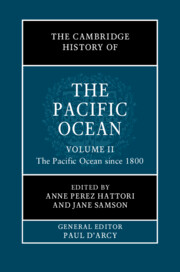Book contents
- The Cambridge History of the Pacific Ocean
- The Cambridge History of the Pacific Ocean
- The Cambridge History of the Pacific Ocean
- Copyright page
- Contents
- Figures
- Tables
- Contributors to Volume II
- Frontispiece
- General Editor’s Introduction
- Preface to Volume II
- Part VII Rethinking the Pacific
- Part VIII Approaches, Sources, and Subaltern Histories of the Modern Pacific
- Part IX Culture Contact and the Impact of Pre-colonial European Influences
- Part X The Colonial Era in the Pacific
- Part XI The Pacific Century?
- Part XII Pacific Futures
- 60 Ancestral Voices of the Sea
- 61 Defining the Contours of the Lagoon
- 62 New Pacific Voyages since Independence
- 63 Creating Sustainable Pacific Environments during the Anthropocene
- 64 Concluding Reflection
- References to Volume II
- Index
63 - Creating Sustainable Pacific Environments during the Anthropocene
The Lessons of Pacific History
from Part XII - Pacific Futures
Published online by Cambridge University Press: 11 November 2022
- The Cambridge History of the Pacific Ocean
- The Cambridge History of the Pacific Ocean
- The Cambridge History of the Pacific Ocean
- Copyright page
- Contents
- Figures
- Tables
- Contributors to Volume II
- Frontispiece
- General Editor’s Introduction
- Preface to Volume II
- Part VII Rethinking the Pacific
- Part VIII Approaches, Sources, and Subaltern Histories of the Modern Pacific
- Part IX Culture Contact and the Impact of Pre-colonial European Influences
- Part X The Colonial Era in the Pacific
- Part XI The Pacific Century?
- Part XII Pacific Futures
- 60 Ancestral Voices of the Sea
- 61 Defining the Contours of the Lagoon
- 62 New Pacific Voyages since Independence
- 63 Creating Sustainable Pacific Environments during the Anthropocene
- 64 Concluding Reflection
- References to Volume II
- Index
Summary
Pacific Island nations are some of the most vulnerable nations on Earth to the negative consequences of global warming. Low-lying atoll nations in the Pacific are already experiencing climate change in terms of the threat of sea level rise, ocean warming, and the intensification of tropical storms. Island nations are increasingly asserting their perspectives on global warming on the world stage as commitments made at international forums consistently fall short of the scientifically agreed minimum reduction of anthropogenic carbon emissions needed to avoid irreversible damage to planetary ecosystems. Less well documented, however, are moves domestically to climate-proof food security and enhance social resilience in island communities. After briefly outlining common threats faced by the majority of Pacific Island communities, this chapter focuses on avenues that are being explored in Federated States of Micronesia (Puas) and French Polynesia (Bambridge) to enhance climate resilience and create sustainable terrestrial and marine ecosystems. Both regions emphasize successful ancestral ways of resource management in partnership with Western science and technology. Colonial rule was more disruptive to these cultural institutions in French Polynesia than in Micronesia, but these institutions persisted in local practice in both locations to enable their recent revival. Both utilize culturally distinct ways of understanding the natural environments and humans’ place in them. Huge challenges remain. Results have been promising, however, and make a strong argument that humans need to respond quickly and flexibly to these latest environmental challenges, drawing inspiration from past generations of Pacific Islanders who colonized and enhanced some of the most challenging ecosystems on Earth.
- Type
- Chapter
- Information
- The Cambridge History of the Pacific Ocean , pp. 776 - 801Publisher: Cambridge University PressPrint publication year: 2023



